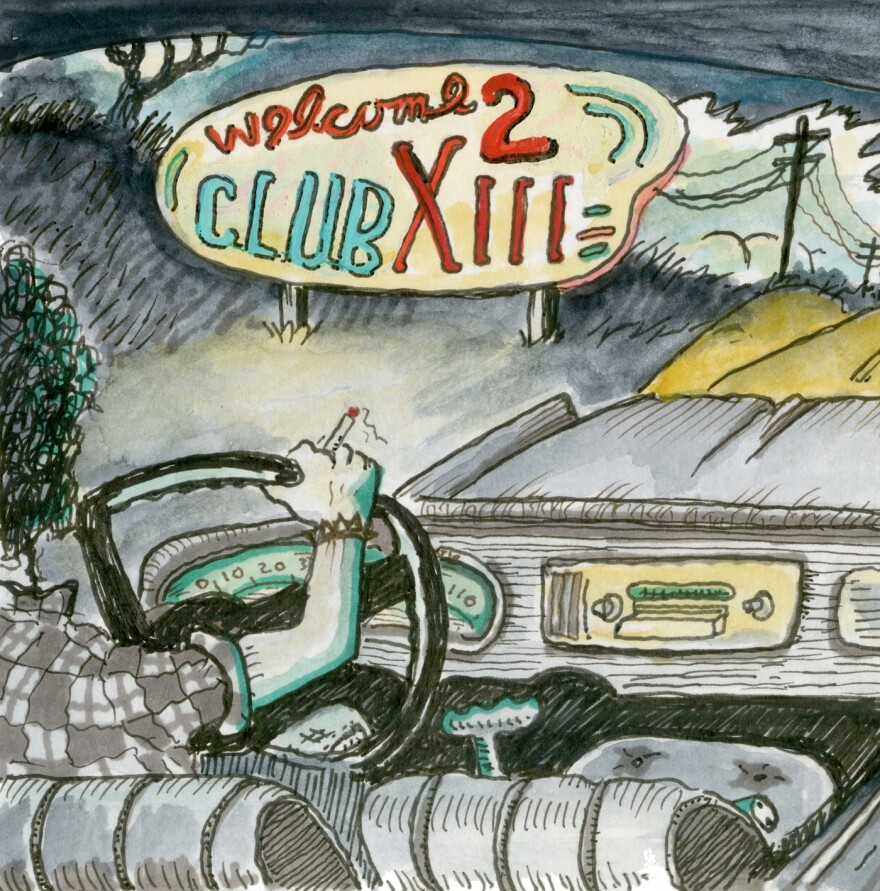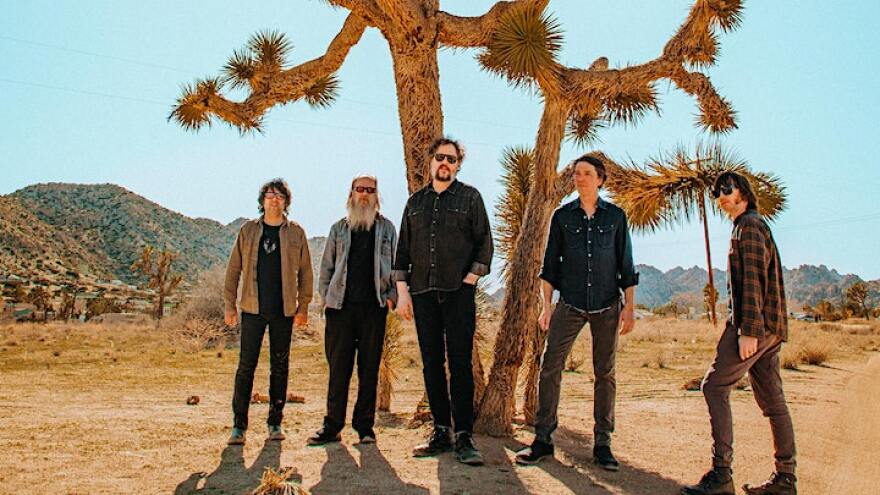Drive-By Truckers bring their "Welcome 2 Club XIII Tour" tour to Rochester Tuesday night, playing an 8 p.m. gig at the Water Street Music Hall.
Formed in 1996, the band last year released its 14th studio album, “Welcome 2 Club XIII” which “marks a sharp departure from the trenchant political commentary of their last three records.” Indeed, the title track pays homage to the Muscle Shoals, Alabama, honky-tonk where founding members Patterson Hood and Mike Cooley got their start many years ago.
Ryan Yarmel, music director of The Route and host of “Afternoons with Yarms” at 2-6 p.m. weekdays on WRUR and WITH, recently spoke with Mike Cooley in advance of this week’s show.
Ryan Yarmel: So, did you have any music stuck in your head today when you woke up?
Mike Cooley: Ah, no, there wasn't. But just so you know, I've actually in the last couple of days been going back and then listening to for some reason Midnight. I think one day maybe a week ago, I think I heard one of the big hits from the 80s. I was like, man, you know, I remember really liking them. And so I listened to a couple of their more recent records that I've never heard. They're great.
RY: Have you as a band played in Rochester before?
MC: We have. I remember doing a festival, maybe kind of a street festival? And I think we did a show at a venue, but I can't remember it. It's been a long time. It might be the same place.
RY: Any particular smells that you remember?
MC: If there are any, I'll probably remember them when I walk in the door. Because sometimes that is what triggers it. Usually, I have to walk into the backstage dressing room or green room before I recognize it because from the stage, they all look the same. To me, anyway.
RY: I watched the performance of DBTs playing at Pickathon back in 2017; it had a nice outdoor festival vibe. And the crowd was in festival mode, if you know what I mean. It seems like you're having a great time. Just on stage, how do different venues and audiences inform you – playing at an outdoor festival like that in the woods as compared to a large famous place like in the film?
MC: The outdoor things when they're good, they’re more chill, and the show's shorter usually. If we're in a theater venue, we're going to be doing over two hours. And so you're usually going out there to do no more than an hour or so, something like that, or sometimes under an hour or so. So it's really chilled out fine. That's all there is to it. And the crowd usually is in that kind of mode too. I'm not I'm not thinking as much about what songs I should or shouldn't play early, because I don't have that second hour to think about, you know?
RY: Yeah, I was going to ask how crafting a setlist changes according to the venue.
MC: Well, we don't use one. We decide what we're going to start with sometimes. And then the second song sometimes, and the third every now. Then we'll decide what we're going to end with. But beyond that, everything in the middle gets just winged.

RY: How is preparing for a long tour like the run that the band is about to go on changed for yourself or the band over the years?
MC: You get a little better at it, I guess. Right now, it depends on how long you've been home. And we've been home almost all summer, except for playing four shows over three months. So we've been home for a month in between all of these. So the hardest thing for me is going to be just remembering to pack – to not be in such a hurry to get out and getting back on the road and playing shows that I just forget to pack.
RY: You love the road. And you just have to remember to bring clothes.
MC: Yeah, I still love it. And right now, I love it a lot.
RY: Do you have a large family or do you hang out with a lot of folks at home?
MC: Oh, yeah. I have five in the immediate family and our kids are all over. One is already out with his own place. But he's over a few times a week, so that's all cool. They're nice people. (but) I still want to go do what I do.
RY: We’re at a point now in music where classic rock is being sort of redefined – there's a lot of bands that were formed in the 80s and 90s celebrating their 25th or 30th anniversary like yourself, and all these radio stations are playing 70s or 80s music now.
MC: I know what you mean. In the 80s, I was in high school – actually, I graduated high school in the mid-80s, and I'm about to be 57. So, yeah, the 80s qualifies for me
RY: Your music fits into that whole scheme.
MC: I don't care as long as there's still an audience out there when I do my thing. It fits wherever they want to put it on their shelf. I'm just the guy who's trying to hang on for dear life.
RY: Do you think audiences are less concerned when the music they're listening to actually came out?
MC: I don’t know. I might be curious, but I don't really care about finding out if I hear something that's new to me when it was made, or that I'm going to change my mind about it now and I don't think it would for anybody else.
RY: You’re a guitar player, and I'm a guitar player too. And I know a lot of guitar players are accumulators of guitars. I wanted to know if you are a big guitar collector, or do they just appear to you?
MC: I like the idea of owning one of everything I like. But for one thing, I've never really had that kind of disposable income to be able to just buy a guitar because I want it. Or at least that's not really what I want to do with it. I do have it. I like to have what I need right now. But every now and then I will come across something that appeals to me, and think “Man, I'd like to have one of those. I can really fit that into this thing or that thing.”
RY: Do you bring a lot of guitars on tour?
MC: These days, I have three electrics, and I pretty much use two of them. I bring out the third one when I just want to want to do it because I feel like it, but it's not really vital or necessary. One acoustic, that's pretty much it. And every now and then I may bring a fourth something or other.
RY: Who were your guitar heroes or inspirations when you were figuring out what to do with the thing?
MC: Oh, pretty much anybody that can get a reaction. And honestly, a lot of it was probably people I couldn't even name – it was some stuff I heard on the radio and thought “Man, that was cool.” And it was probably some session guy, probably somebody I'm real familiar with now, but just didn't know that person played that part.
RY: Do you have any advice for a band just starting out?
MC: Not really, other than playing anywhere you can as much as you can. That sounds so simple and dumb. But really, if that's what you're going to do, that's more important than anything.
RY: I know a lot of musicians don't have a choice in the matter. You know, if they're a musician or not, or when a song comes to them, it just sort of happens. Do you ever have any escapist tendencies where you have a different path?
MC: Not really.
RY: So it sounds like you have peace of mind with the fact that you're a rock and roller.
MC: Yeah, if I didn't at this point…
RY: What do you do to maintain that love and freshness of what you do after doing it for a few decades now?
MC: It comes and goes, but I don't have any trouble. I really don't struggle with it at all. We don't burn ourselves out. We haven't done that in years, you know, like at a couple of points many years ago. Now we hit it real hard.
A couple of times we’ve gotten pretty burned out on it – we were having internal struggles and everything that happens with growing pains that are pretty normal. But for a long time now we've been in a nice place where we're all ready to get back to it when it's time to go.

If You Go
Who: Drive-By Truckers, with American Aquarium opening
When: 8 p.m. Tuesday, Sept. 26
Where: Water Street Music Hall, 204 N. Water St., Rochester
Cost: $48, available online here



